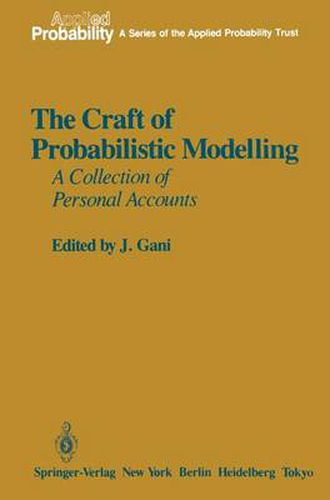Readings Newsletter
Become a Readings Member to make your shopping experience even easier.
Sign in or sign up for free!
You’re not far away from qualifying for FREE standard shipping within Australia
You’ve qualified for FREE standard shipping within Australia
The cart is loading…






This title is printed to order. This book may have been self-published. If so, we cannot guarantee the quality of the content. In the main most books will have gone through the editing process however some may not. We therefore suggest that you be aware of this before ordering this book. If in doubt check either the author or publisher’s details as we are unable to accept any returns unless they are faulty. Please contact us if you have any questions.
This book brings together the personal accounts and reflections of nineteen mathematical model-builders, whose specialty is probabilistic modelling. The reader may well wonder why, apart from personal interest, one should commission and edit such a collection of articles. There are, of course, many reasons, but perhaps the three most relevant are: (i) a philosophicaJ interest in conceptual models; this is an interest shared by everyone who has ever puzzled over the relationship between thought and reality; (ii) a conviction, not unsupported by empirical evidence, that probabilistic modelling has an important contribution to make to scientific research; and finally (iii) a curiosity, historical in its nature, about the complex interplay between personal events and the development of a field of mathematical research, namely applied probability. Let me discuss each of these in turn. Philosophical Abstraction, the formation of concepts, and the construction of conceptual models present us with complex philosophical problems which date back to Democritus, Plato and Aristotle. We have all, at one time or another, wondered just how we think; are our thoughts, concepts and models of reality approxim&tions to the truth, or are they simply functional constructs helping us to master our environment? Nowhere are these problems more apparent than in mathematical model ling, where idealized concepts and constructions replace the imperfect realities for which they stand.
$9.00 standard shipping within Australia
FREE standard shipping within Australia for orders over $100.00
Express & International shipping calculated at checkout
This title is printed to order. This book may have been self-published. If so, we cannot guarantee the quality of the content. In the main most books will have gone through the editing process however some may not. We therefore suggest that you be aware of this before ordering this book. If in doubt check either the author or publisher’s details as we are unable to accept any returns unless they are faulty. Please contact us if you have any questions.
This book brings together the personal accounts and reflections of nineteen mathematical model-builders, whose specialty is probabilistic modelling. The reader may well wonder why, apart from personal interest, one should commission and edit such a collection of articles. There are, of course, many reasons, but perhaps the three most relevant are: (i) a philosophicaJ interest in conceptual models; this is an interest shared by everyone who has ever puzzled over the relationship between thought and reality; (ii) a conviction, not unsupported by empirical evidence, that probabilistic modelling has an important contribution to make to scientific research; and finally (iii) a curiosity, historical in its nature, about the complex interplay between personal events and the development of a field of mathematical research, namely applied probability. Let me discuss each of these in turn. Philosophical Abstraction, the formation of concepts, and the construction of conceptual models present us with complex philosophical problems which date back to Democritus, Plato and Aristotle. We have all, at one time or another, wondered just how we think; are our thoughts, concepts and models of reality approxim&tions to the truth, or are they simply functional constructs helping us to master our environment? Nowhere are these problems more apparent than in mathematical model ling, where idealized concepts and constructions replace the imperfect realities for which they stand.